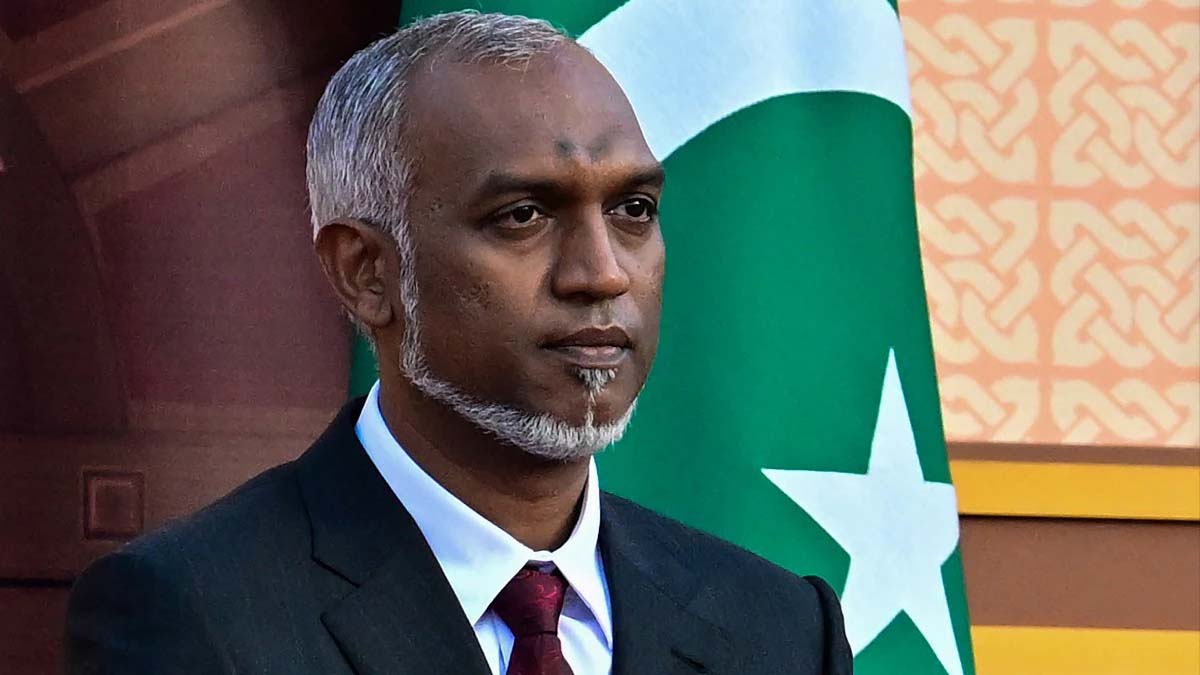A Curious Spectacle Unfolds
In the aftermath of Maldives President Mohamed Muizzu’s party People’s National Congress (PNC) securing a parliamentary majority in the recent elections, a delicate dance of geopolitical speculations emerges. The focus shifts to the complex interplay between India and this Indian Ocean archipelago, given Muizzu’s pro-Beijing stance and his less-than-friendly approach toward New Delhi.
The electoral saga unfolded amidst a bitter dispute between Muizzu and the outgoing People’s Majlis, with the latter obstructing numerous initiatives and the appointment of three cabinet members handpicked by the President.
A Decisive Triumph
Muizzu’s PNC emerged victorious in a landslide, dealing a significant blow to the Maldivian Democratic Party (MDP), which had previously swept the 2019 elections. This outcome is widely interpreted as an endorsement of Muizzu’s vision for enhanced economic collaboration with China and a rebuff to the pro-India stance of the MDP, which sought to disrupt the country’s diplomatic realignment.
The Geopolitical Chessboard
Yet, the truth remains stark: the Maldives treads a delicate tightrope, mindful of India’s proximal presence.
“Pragmatism is a must for any leader in power,” remarked Smruti Pattanaik, a Research Fellow at the Manohar Parrikar Institute of Defence Studies and Analyses (MP-IDSA), specializing in South Asia. “Campaign rhetoric often diverges from governing realities,” she added in a recent interview with ETV Bharat.
Muizzu’s Posture Towards India
Muizzu rode to victory in last year’s presidential elections on a platform that strongly opposed Indian influence. His ‘India Out’ campaign called for the withdrawal of a small contingent of Indian military personnel engaged in humanitarian work within the Maldives. Upon assuming office, Muizzu formally requested India’s withdrawal, subsequently replacing these personnel with Indian civilians.
Last December, the Maldives chose not to renew a hydrography agreement with India, citing concerns over national security and the protection of sensitive data. This agreement, inked during Prime Minister Narendra Modi’s 2019 visit, allowed India to conduct extensive studies of the Maldives’ territorial waters, including reefs, lagoons, and oceanic currents.
Navigating Choppy Waters
In a bold move this January, the Maldives permitted a Chinese research vessel into its waters, defying Indian pressure and suspicions of espionage. India has vehemently protested such incursions into what it perceives as its sphere of influence in the south Indian Ocean.
Tensions flared further when Indian Prime Minister Modi promoted the union territory of Lakshadweep as a tourist destination. Though Modi’s remarks did not explicitly target the Maldives, some Maldivian figures construed it as a competitive jab at their tourism industry. This led to a social media firestorm, with disparaging remarks against Modi and Indians in general.
A Diplomatic Tango
Responding to the row, Muizzu departed for an extended visit to China, a departure from his predecessors’ tradition of making India their first state visit. Moreover, Muizzu targeted the health sector by expanding the countries available for Maldivians’ overseas medical treatment beyond India and Sri Lanka, engaging with Thailand and the United Arab Emirates (UAE), despite higher costs.
India’s Stance and Strategic Imperatives
For India, the Maldives remains a crucial linchpin in its ‘Neighbourhood First Policy,’ owing to its strategic location in the Indian Ocean. The historical, cultural, and commercial ties between the two nations are deeply rooted, but the Maldives’ internal instability since 2008 has strained relations.
India’s pivotal role in ensuring regional stability cannot be understated, particularly for a nation like the Maldives, heavily reliant on maritime trade and tourism. Disruptions in diplomatic ties could severely impact the Maldives’ economy and its citizens’ well-being.
The Pendulum Swings
The Maldives’ diplomatic balancing act also considers its sizable population residing in India, along with shared religious and linguistic bonds. Strained ties with India could create a void, potentially filled by other regional powers, jeopardizing the Maldives’ sovereignty.
Muizzu’s Conciliatory Gestures
In a surprising shift, Muizzu recently extended an olive branch to India, acknowledging its role as the Maldives’ closest ally. He expressed hope for debt relief from India, given the hefty loans burdening his nation. Discussions are underway to explore leniencies in repayment, with Muizzu emphasizing the significance of India’s support.
A Hopeful Horizon
Despite the tumultuous geopolitical landscape, recent developments suggest a cautious optimism. India’s selective relaxations on exports to the Maldives and enhanced bilateral agreements indicate a thaw in relations. Muizzu’s overtures towards debt restructuring and India’s accommodating responses signal a potential detente in this intricate diplomatic tango.
Conclusion: A Delicate Equilibrium
As the political dynamics continue to evolve, the Maldives stands at a crossroads, balancing its aspirations for regional autonomy with the pragmatic need for strategic partnerships. The intricate dance between pro-Beijing inclinations and the historical ties with India paints a nuanced portrait of foreign policy in flux. Muizzu’s diplomatic maneuvers underscore the delicate equilibrium between regional power plays and economic pragmatism in this vibrant Indian Ocean archipelago.









